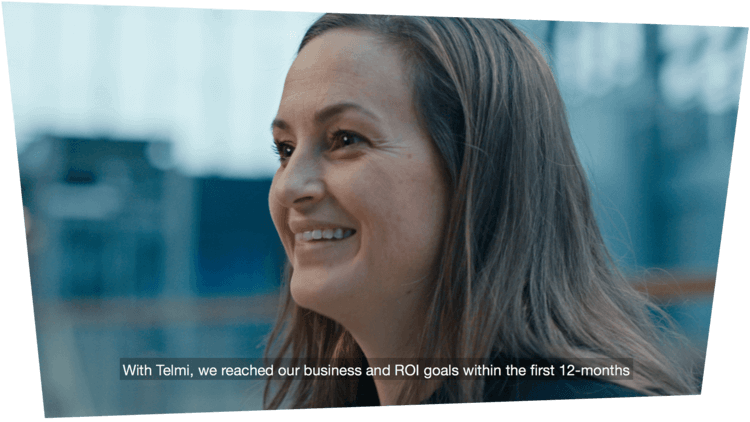With over 20 unique integrations, Telenor’s virtual agent Telmi is one of the most advanced of its kind in the world.
In 2023, enhancing telecom customer experience is still a primary concern for all telecom companies. Already, in 2019, the American Customer Satisfaction Index research revealed that telcos placed last in customer satisfaction when ranked against other private sector companies such as banks and insurance firms. Given customers' highly heightened expectation of technical savvy and fast responses, telecom companies must take concrete steps to ensure they can deliver a consistently satisfying business-to-consumer experience. Investing in customer service infrastructure, formulating policies that help maintain effective communication channels with customers, and developing a better customer service strategy could all contribute to telecom customer experience improvement.
This very issue was at the center of Norwegian telecommunications giant Telenor’s drive to digitize its customer service offerings with the introduction of conversational artificial intelligence. “Communication is at the heart of everything we do at Telenor,” says Anna Måsender, the company’s Head of Customer Service. Måsender is principally responsible for Telenor’s omnichannel support strategy and is spearheading the adoption of automated online chat as a leading method of company-customer communication. “Customers come to us with issues that are important and individual to them, and we need to be both easily accessible when they require it, and capable of making them feel reassured. Conversational AI presents itself as the perfect platform to achieve these goals,” adds Måsender.
One of the most advanced virtual agents of its kind

In late 2018, Telenor approached boost.ai to develop an innovative solution that would allow its customers to take advantage of the company’s wide portfolio of products and services with as little friction as possible. This took the form of an ai customer service virtual agent named Telmi that, today, can be easily accessed via the telco’s website. Thanks to deep learning algorithms and natural language technologies, Telmi is able to understand and interact with customers at an advanced conversational level, delivering near-instant assistance at far greater speeds than traditional customer service channels.
Telmi also currently offers over 20 unique integrations, making it one of the most advanced virtual agents of its kind in the world. “Integrations are a key part of Telmi’s functionality, giving our customers agency over the process by incorporating their subscription and services into every interaction,” says Jens Mosbergvik, Head of Operational Support, Customer Care. “We learned early on that customers are not simply looking for answers but require tangible solutions. It’s a small difference, but a crucial one.”
In order to deliver these solutions, Telmi offers a range of functionality to customers who are logged into their Telenor account, including requesting a PUK code, upgrading their mobile data plan, or viewing their invoice directly in the chat window. “Telmi can access a customer’s account and retrieve the information that they need, instantly,” says Morten Lossius, an AI Trainer who is part of the team at Telenor responsible for bringing Telmi online. “If a customer needs more data, for example, Telmi orders it for them, so that they can continue to use their phone without any downtime,”
The AI trainer team is in charge of measuring the experience and satisfaction of customers as they interact with Telmi. They do this via boost.ai’s easy-to-use software which allows them to monitor the quality of each integration, improving the virtual agent and continuously striving towards a better telecom customer experience.
Exceeding expectations in less than 12 months

From a business perspective, Telmi exceeded the expectations that were outlined by Telenor when the project launched in January 2019. The clear business and ROI goals that the company had defined were easily achieved within the first year, and Telmi further proved itself useful, acting as an additional sales channel rather than just a simple answer-bot.
A fact that is bolstered by a study published by McKinsey that reported increases in customer satisfaction rates of more than 20% (and revenue increases of up to 15%) when companies actively prioritized customer experience. Through the development and implementation of its virtual agent, Telenor gained a greater understanding of how conversational AI can add overall value to its business and for customers going forward, instead of only being looked at as a source of cost-cutting.
“As Scandinavia’s largest telecommunications company, it is important for us to have a clear vision of where we want our digital customer service strategy to be within five years,” adds Måsender, who explains that this applies both in terms of volume and scope, but also in terms of customer experience. “Telmi gives us the flexibility to achieve this without compromising on the high customer service standards that we set for ourselves.”